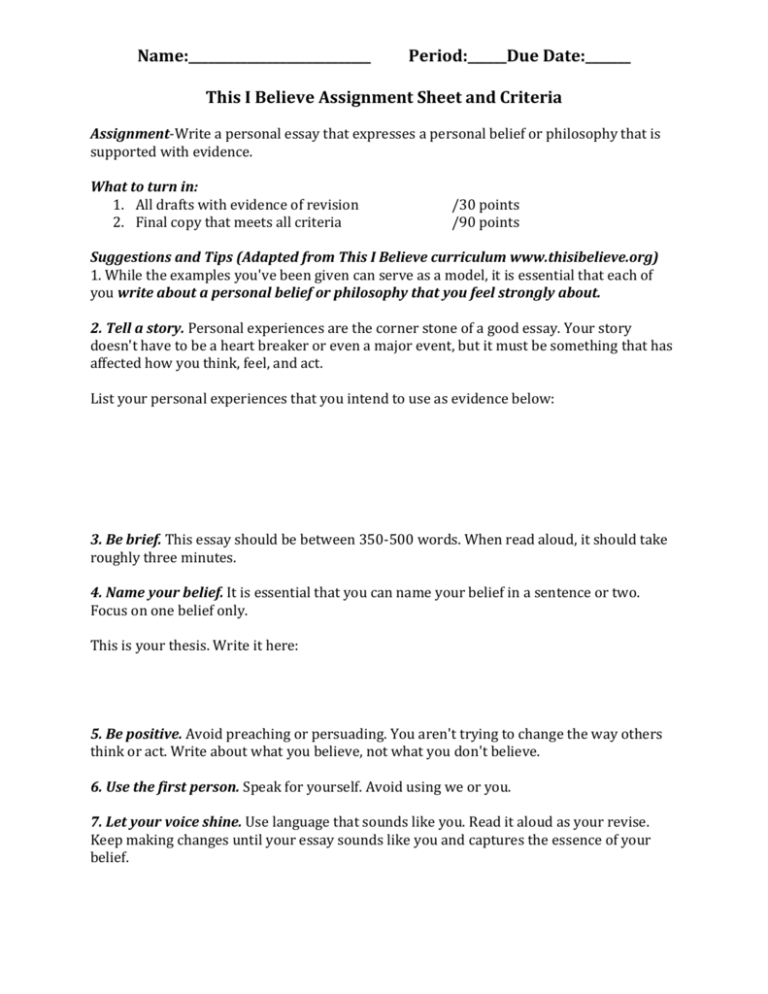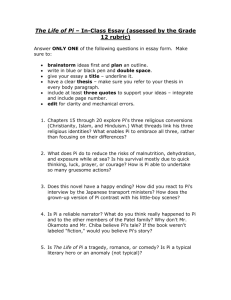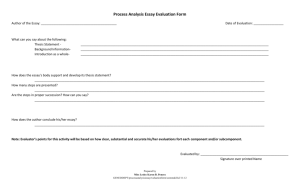This I Believe
advertisement

Name:____________________________ Period:______Due Date:_______ This I Believe Assignment Sheet and Criteria Assignment-Write a personal essay that expresses a personal belief or philosophy that is supported with evidence. What to turn in: 1. All drafts with evidence of revision 2. Final copy that meets all criteria /30 points /90 points Suggestions and Tips (Adapted from This I Believe curriculum www.thisibelieve.org) 1. While the examples you've been given can serve as a model, it is essential that each of you write about a personal belief or philosophy that you feel strongly about. 2. Tell a story. Personal experiences are the corner stone of a good essay. Your story doesn't have to be a heart breaker or even a major event, but it must be something that has affected how you think, feel, and act. List your personal experiences that you intend to use as evidence below: 3. Be brief. This essay should be between 350-500 words. When read aloud, it should take roughly three minutes. 4. Name your belief. It is essential that you can name your belief in a sentence or two. Focus on one belief only. This is your thesis. Write it here: 5. Be positive. Avoid preaching or persuading. You aren't trying to change the way others think or act. Write about what you believe, not what you don't believe. 6. Use the first person. Speak for yourself. Avoid using we or you. 7. Let your voice shine. Use language that sounds like you. Read it aloud as your revise. Keep making changes until your essay sounds like you and captures the essence of your belief. 1. Thesis Statement—a strong thesis provides a roadmap by stating what the essay will prove. Thesis statements can be directly stated or implied, but they typically are found in the first paragraph. Write your thesis statement in the space below and highlight it on your essay. 1 2 3 4 5 6 2. Introduction: What kind of introduction did you use? Mini-story Quotation Question Strong Statement 1 2 3 4 5 6 3. Evidence: Back up your thesis with specific evidence. Personal Experiences Experiences of Others Quotations Disproving the Opposite 1 2 3 4 5 6 4. Conclusion: What kind of conclusion did you use? Circle back Look to the Future Figurative Language Final Example 1 2 3 4 5 6 5. Transitions: Refer back to your thesis. Keep your essay moving. These can be simple: First, In addition, Finally They can also be more complex, finding a thread in your introduction that you can weave throughout the essay. 1 2 3 4 5 6 6. Tight Writing: Strong Verbs Concrete images/specific details Figurative language—simile, metaphor, personification Sound devices—alliteration, assonance, rhyme Use the “Exemplary Essay Elements” as mentor lines 1 2 3 4 5 6 7. SPRUCE Spelling Punctuation Read aloud Use the write word Capitalization Each paragraph is indented (new idea=new paragraph) 1 2 3 4 5 6







